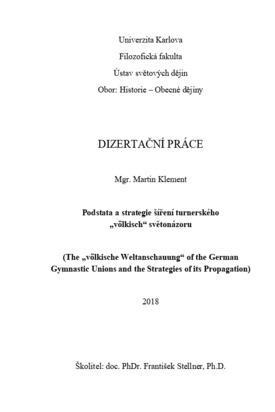Podstata a strategie šíření turnerského "völkisch" světonázoru
The "völkische Weltanschauung" of the German Gymnastic Unions and the Strategies of its Propagation
dizertační práce (OBHÁJENO)

Zobrazit/
Trvalý odkaz
http://hdl.handle.net/20.500.11956/105486Identifikátory
SIS: 116989
Kolekce
- Kvalifikační práce [25007]
Autor
Vedoucí práce
Oponent práce
Skřivan, Aleš
Kaiserová, Kristina
Fakulta / součást
Filozofická fakulta
Obor
Historie/obecné dějiny
Katedra / ústav / klinika
Ústav světových dějin
Datum obhajoby
20. 2. 2019
Nakladatel
Univerzita Karlova, Filozofická fakultaJazyk
Čeština
Známka
Prospěl/a
Klíčová slova (česky)
turnerství|"völkisch"|indoktrinace|"dietwarti"|krásná literatura|periodika|festivity|mládežKlíčová slova (anglicky)
Gymnastic|"völkisch"|"Weltanschauung"|Indoctrination|"Dietwarte"|Fiction Literature|Periodical|YouthV rakousko-uherských, etnicky německých tělovýchovných svazech "Deutscher Turnerbund" a "Turnkreis Deutsch-Österreich", v rakouském svazu "Deutscher Turnerbund 1919", ve svazu "Deutscher Turnverband", který existoval v Československu, a v některých segmentech říšskoněmeckého svazu "Deutsche Turnerschaft" byly mezi koncem 80. let 19. století a počátkem 30. let 20. století oficiálně zastávány a šířeny "rasové", nacionalistické a religiózně-etické ideje, pro jejichž soubor dobové prameny i německá historiografie používají obrat "völkische Weltanschauung" - "völkisch" světonázor. S pomocí odborné literatury, archivních písemností a především dosud přehlížených vydaných pramenů, například svazových periodik, výchovně-vzdělávacích brožur či beletristických knih, se dizertační práce analyticko-syntetickou metodou a v komparativní perspektivě pokouší odpovědět na otázky, z jakých myšlenek turnerský "völkisch" světonázor sestával, kdo jej formuloval a jak se vyvíjel. Zvláštní pozornost je dále věnována instituci vzdělavatelů ("dietwartů), krásné literatuře, periodikům a festivitám - čtyřem strategiím využívaným k indoktrinaci dospělých cvičenců a turnerské mládeže světonázorovými ideami. Tematickou šíří a zejména distinkcí mezi oficiálním svazovým světonázorem a světonázorem jednotlivých turnerů se studie...
In the Austrian-Hungarian, ethnically German gymnastic unions of "Deutscher Turnerbund" and "Turnkreis Deutsch-Österreich", between the late 1880s and 1918 there was an officially propagandized set of racial, nationalistic and religiously-ethical opinions known in the German literature as the "völkische Weltanschauung". This propaganda was also seen after the World War I in the Austrian union of "Deutscher Turnerbund 1919", in the union of "Deutscher Turnverband" which used to exist in the Czechoslovakia and in some segments of the German union of "Deutsche Turnerschaft". Using the newest search results, archival sources and until now predominantly ignored literature (e.g. unions periodicals, educational booklets and novels), this dissertation applies the analytic-synthetic and comparatively orientated method to answer the questions, which ideas the "völkische Weltanschauung" was consisted of, who formulated them and how they have been developed over time. Special attention is payed to the principles and effectiveness of the educational institutions (the so- called institution of the "Dietwarte"), fiction literature, periodicals and festivities in the process of the indoctrination of the young and old gymnasts. For the breadth of themes and the distinction between the official unions...
